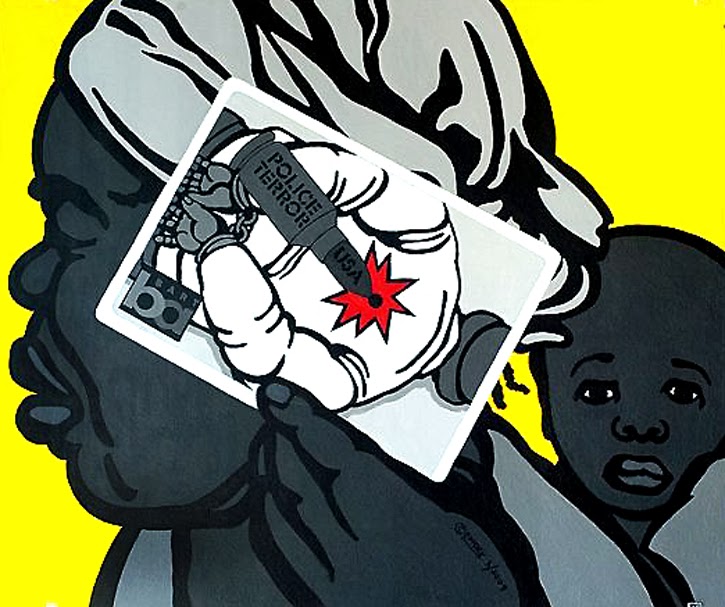
There’s a certain liberal optimism about race in the United States, and last night’s Ferguson grand jury verdict unmasked the complacency that lies underneath it. For decades we’ve watched as the legacy of anti-racist movements has been channeled towards the economic and political advancement of individuals like Barack Obama and Bill Cosby. And we’ve watched such individuals lead the attack against social movements and marginalized communities – today, they are the ones urging restraint.
No serious challenge has yet arisen to this co-opting of the anti-racist legacy. Within the academy and within social movements, intellectuals and activists have rendered ourselves totally impotent. We’ve reduced politics to the policing of our language, to the questionable satisfaction of provoking white guilt. And we have allowed our present to become the age of Oscar Grant, Troy Davis, Trayvon Martin, and Mike Brown.
There is a rebellion taking place in Ferguson, which has spread to Chicago, Philadelphia, New York, and Oakland, and this rebellion shows that it’s time for us to wake up. Once upon a time, movements against racism came to understand that it was not enough to make space for black and brown people in the American dream of social mobility; it was necessary to make a demand for power – Black Power, and all the militant movements of Chicano/a and Asian-American communities which emerged alongside it. The action that took place in the streets last night should remind us of the universal and ongoing significance of this historical rupture.
Malcolm X’s famous analysis of the “House Negro” in “Message to the Grassroots” was not merely a rhetorical response to individuals who tended towards liberal compromise. It was a complex analysis of the structural role played by black leadership, and its suppression of autonomous mass action. “They controlled you,” Malcolm said. “They contained you; they kept you on the plantation.”
Malcolm’s analysis was cut short by his 1965 assassination by the cultural nationalists of the Nation of Islam, with whom he had broken after connecting with revolutionary anti-colonial movements in Africa and Asia, constantly invoked in his speeches. He had deepened his structural analysis of white supremacy and the economic system on which it rested. As Ferruccio Gambino has demonstrated, this is not surprising when we look at Malcolm’s life as a laborer – as a Pullman Porter, or as a final assembler at the Ford Wayne Assembly Plant, where he encountered the tension between the workers’ antagonism towards the employer and the restraint imposed by the union bureaucracies.
“It’s impossible for a white person to believe in capitalism and not believe in racism,” Malcolm said in a 1964 discussion. “You can’t have capitalism without racism. And if you find one and you happen to get that person into conversation and they have a philosophy that makes you sure they don’t have this racism in their outlook, usually they’re socialists or their political philosophy is socialism.”
When the Black Panther Party followed through on Malcolm’s analysis, they extended it to cultural nationalism, which they called “pork chop nationalism” – an ideology which claimed that rediscovering some purportedly unitary African culture would spontaneously lead to black liberation. Its ultimate trajectory was figures like “Papa Doc” Duvalier, dictator of Haiti – it erased the political and economic contradictions within the black community. The “revolutionary nationalism” of the Panthers was necessarily socialist – as Huey P. Newton put it, “if you are a reactionary nationalist you are not a socialist and your end goal is the oppression of the people.” The Black Panther Party, he said, had to draw a “line of demarcation” between the “black bourgeoisie” and “the black have-nots.”
As Angela Davis has remarked, “It doesn’t surprise me that aspect of the black nationalist movement, the cultural side, has triumphed because that is the aspect of the movement that was most commodifiable.” She points to its “connection with the rise of a black middle class,” and reminds us that the “tradition of anti-imperialist, anti-capitalist struggle… is one that has to be fought for and recrafted continuously.”
Identity politics has often seemed an innocuous, if somewhat humorless, progressive phenomenon. But as black youth continue to be sent to prison or murdered by police, as black communities are kept in states of unconscionable poverty, as migrant laborers continue to be exploited in obscene working conditions, and as our first black president continues to wage imperialist wars, it becomes clearer that a politics which unites us with Obama and Cosby is not simply inadequate – it is criminal. It is part of the reactionary legacy of cultural nationalism, and it has been fueled by the growing economic inequality of capitalism that the Black Power movement so powerfully condemned.
The revolt in response to the Ferguson verdict is a sign that a collaborationist leadership can never wipe out the grassroots. As autonomous action lights up the streets, those of us who care about justice have a responsibility to follow its lead – it is time for us to proclaim once again that the struggle against racism requires a mass movement against capitalism, and when people who are exploited and dominated take the initiative to act, this possibility is put on the table.
 Viewpoint Magazine
Viewpoint Magazine